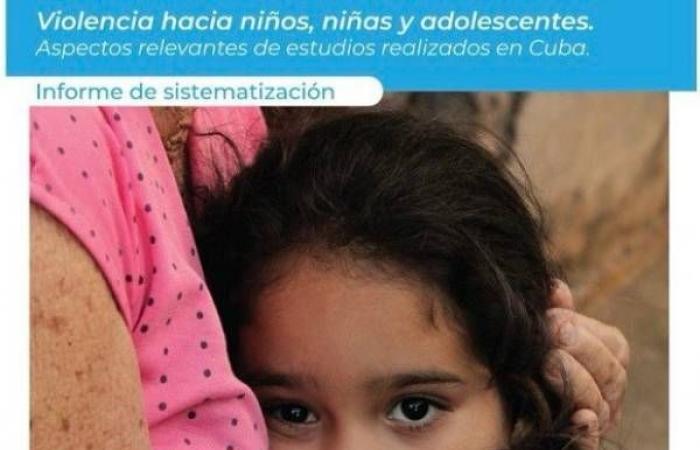
The research “Violence against children and adolescents” could be classified as a valuable tool to prevent and confront violence against children and adolescents. Relevant aspects of studies carried out in Cuba. Systematization report”, presented this Monday in Havana.
The text, from Unicef-Cuba and carried out by researchers Clotilde Proveyer, María Antonia Miranda and Succel Pardini, includes 209 studies carried out in the Caribbean nation between 2000 and 2020 where it is possible to find keys to domestic violence, in the school, institutional and peer settings.
Sexual violence, discrimination based on gender identity and violence in the digital environment are also reflected in the document, which becomes essential reference material to train different actors in society on these issues, on the path to prevention.
The report, according to the Unicef-Cuba prologue, is a clear example of the usefulness of social research to make visible a multidimensional problem, find gaps and trends, to rethink policies, strategies and programmatic actions that allow acting in a more accurate in the face of the impacts of a phenomenon like the one that concerns this study.
One of the authors, the sociologist Clotilde Proveyer, said that the systematization of scientific publications of various kinds, conference proceedings, theses and reports of professional practices, among others, showed several faces of the violence that is exercised against infants and adolescents in the island, such as forms of violent discipline and exposure to domestic and/or gender violence.
Likewise, it highlighted problems such as self-inflicted injuries and suicide at these ages, in addition to abuse and discriminatory violence for different reasons.
The expert highlighted, as one of the relevant aspects of the compilation, that it made it possible to verify the link between the different forms of abuse, many of which occur simultaneously or encourage the exercise of others, something that should not be lost sight of. when designing prevention strategies.
Regarding this matter, Francisco Pichón, resident coordinator of the United Nations System in Cuba, highlighted that the analysis places on the table several challenges for society, such as the prevalence of patriarchal culture and gender stereotypes, issues that are at the center of national policies and are part of the United Nations commitments with the country and with the 2030 Agenda for Sustainable Development.
“The report confirms the urgency of working with mothers, fathers and other caregivers of children and adolescents on how to parent without violence,” notes the prologue of the publication, which also points out the need to draw attention to beliefs and behaviors that They make invisible situations where the rights of children and adolescents are violated.
It is a starting point both for action and for undertaking new research that delves into other areas and takes into account aspects such as the fact that there are still few studies that privilege the voices of children and adolescents.
Scientific inquiry is a tool for a better understanding of reality and, in this case, to transform the conceptions and practices that reproduce violence, draw up better action protocols and perfect actions to prevent and respond effectively to violence in these stages of life.
In this sense, “Violence towards children and adolescents. Relevant aspects of studies carried out in Cuba… already have a long way to go, since their results and recommendations were input for the construction of a communicative strategy for social and behavioral change promoted by Unicef Cuba.
Called Measure yourself against violence against children and adolescents, the initiative has been implemented since 2021 and proposes a communicative narrative focused on positive parenting, the responsible use of social networks and the prevention of gender violence and child sexual abuse.
(Taken from Cubadebate).

